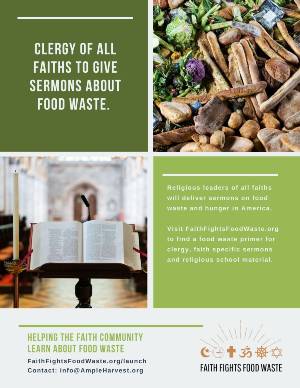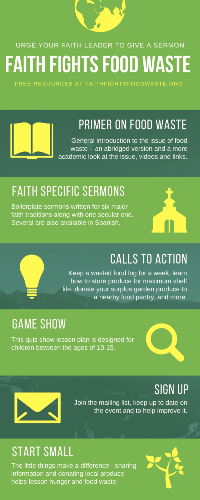
Faith Fights Food Waste provides free resources to learn, and then speak about the staggering amount of food that goes to waste. Help your congregation learn what their faith says about food waste with the resources on this page, which include faith-specific calls to action, videos, and a Unitarian Universalist sermon.
- Learn more about food waste. Includes background info, links to helpful sites and videos.
- Download your sermon – yours to revise as needed.
- Select your calls to action – choose what will work in your community.
- Optionally download material for your religious school and your newsletter.
- Give your sermon.
- If you have a food pantry, make sure that it is signed up at AmpleHarvest.org to be able to receive excess locally grown fresh food. It’s free, and the food pantry does not need additional refrigeration or storage. It’s an excellent way to reduce food waste and help feed the hungry in your community.
- Lastly, please take a quick moment to fill in this short survey to let us know how it went and share any thoughts/suggestions you might have.
- EPA’s Sustainable Management of Food Learn about the issue along with what businesses, institutions, organizations and individuals can do to reduce food waste
- EPA’s Food Stewards Toolkit This toolkit includes printable resources for starting a food stewards team at your house of worship. In the toolkit, you can learn more about how to modify food purchases, donate, compost, get others involved and share your story.
- Further with Food: Center for Food Loss and Waste Solutions Find and share information on this website about proven solutions and innovative new approaches to reducing food loss and waste
- ReFed.com A data driven guide to business, government, funders and nonprofits to reduce food waste
- NRDC White Paper How America is losing up to 40% of its food from farm to fork to landfill
- WastedFood.com Why we waste food, why it matters and what we can do about it
- USDA Report Why We Should Care About Food Loss
- USDA Report Food Loss Information for Consumers
- USDA Report The Estimated Amount, Value, and Calories of Postharvest Food Losses in the US (Business Oriented)
- Garden Food Waste Recent report on the extent of food lost in America’s home and community gardens
- National Geographic One-Third of Food Is Lost or Wasted: What Can Be Done
- United Nations Report Global Food Losses and Food Waste (Gustavsson, et al.)
- World Food Clock See how much food the world wastes every second.
- American Wasteland Best book available on the topic. By Jonathan Bloom. .
- how they feel about food waste
- what changes they will make in their life to reduce food waste
- how then think food waste affected them or their community in the past
- what changes they think your house of worship can do to set an example
- for those who are home/community gardeners, ask if they’d donate their excess bounty to a local food pantry
- Click here to see if your food pantry has already signed up with AmpleHarvest.org. If it has, great!
- If it has not yet signed up, then we suggest that you print out this flier and ask your food pantry manager to register ASAP. You can assure them that its free, they won’t need extra storage and they wont need more refrigeration.
- Next, print this flyer and encourage your congregants to post it around the community.
- Lastly, please take a quick moment to fill in this short survey to let us know how it went and share any thoughts/suggestions you might have.
This program is free because of our generous funders. Before you get started, we’d really appreciate it if you’d sign up and tell us a bit about yourself.
1. Learn about the problem of food waste.
A quick and a more in-depth document, links and videos
A First Look at Food Waste
This is the easier document
Food waste is a massive problem of multiple dimensions – both domestically and across the globe—and it impacts both developed countries and developing countries.
Estimates of the level of food waste are staggering. Globally, a recent report by the Institution of Mechanical Engineers estimates that 30-50% of all food produced (between 1.2 and 2 billion tons) is lost before being consumed by humans.
Food Waste in America—A Current Conundrum
This is the more in-depth document
Picture this: You’re up early on a weekend morning at your favorite grocery store, looking to get a jump start on your weekend. Virtually the only person in the store a few minutes after six AM, you head back to the meat department to get the main course for a special meal that night. You immediately notice a store employee pulling multiple packs of high-grade meat off the shelves – ribs, filets, steaks and ground beef – and tossing them into a rolling cart. With a sinking feeling, you ask “Are you throwing all of that out?” “Yes,” he replies, “It’s past its sell-by date.” Stunned, you ask, “Don’t you donate any of that?” “No, we don’t do that, we don’t want anyone suing us,” he answers.
If you want to learn more…
Videos
| The Extraordinary Life and Times of Strawberry | Save The Food | Ad Council | Tristram Stuart: The global food waste scandal |
| The environmental impacts of food waste | Gary Oppenheimer :AmpleHarvest.org — TEDx talk on ending food waste in 42 million home/community gardens |
2. Download your sermon – yours to revise as needed.
Sample Sermon
Hunger and climate change.
Our living tradition teaches us that no one should be hungry and that we are supposed to help those who are. The very first of our seven principles affirms “the inherent worth and dignity of every person.” Hunger erodes that dignity, attacks that worth.
Our tradition also teaches us that we are morally bound to care for the good earth, responsible for this remarkable gift. Our seventh tradition expresses respect for “the interdependent web of all existence of which we are a part.”
This weekend, these two principles come together.
3. Calls to Action
There are 9 Calls to Action from which we suggest that you pick 2 or 3 to challenge your congregants to take. There is also a bonus Call to Action for your house of worship too!
If you are in a community (USA only) where people have home or community gardens, we strongly urge you to also include Call to Action #1 – donating excess garden produce.
If you want to print out the Calls to Action, we’ve included the links at the bottom of each one.
4. Optional Material
Infographics and posters
5. When you’re ready, give your sermon
Then encourage your congregation to select a “call to action” and then ask them the following week “how’s it going?”.
You might want to encourage your congregation to discuss
If your faith tradition allows for it, consider inviting the local media to cover the service. It is an excellent way of helping people who were unable to attend in person, to still learn about food waste.
6. Your community
If Your Church Has a Food Pantry….
It is totally free for a food pantry to sign-up with AmpleHarvest.org. This helps local home and community gardeners know where to donate excess fresh food from their garden – an easy first step towards helping to end food waste!



